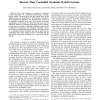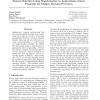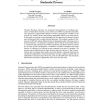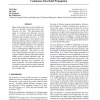509 search results - page 10 / 102 » Using Learning for Approximation in Stochastic Processes |
109
click to vote
CDC
2008
IEEE
15 years 8 months ago
2008
IEEE
ate Abstractions of Discrete-Time Controlled Stochastic Hybrid Systems Alessandro D’Innocenzo, Alessandro Abate, and Maria D. Di Benedetto — This work proposes a procedure to c...
139
click to vote
ICML
2010
IEEE
15 years 3 months ago
2010
IEEE
Approximate dynamic programming has been used successfully in a large variety of domains, but it relies on a small set of provided approximation features to calculate solutions re...
123
Voted
NIPS
2007
15 years 3 months ago
2007
Dynamic Bayesian networks are structured representations of stochastic processes. Despite their structure, exact inference in DBNs is generally intractable. One approach to approx...
121
click to vote
FOCI
2007
IEEE
15 years 8 months ago
2007
IEEE
— A learning machine is called singular if its Fisher information matrix is singular. Almost all learning machines used in information processing are singular, for example, layer...
145
click to vote
ICML
2010
IEEE
15 years 3 months ago
2010
IEEE
Many temporal processes can be naturally modeled as a stochastic system that evolves continuously over time. The representation language of continuous-time Bayesian networks allow...




